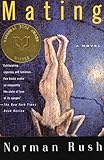 At the start of 2009, I reread Norman Rush’s Mating, as I have each year since 1995, when I received the book as a birthday gift. My well-worn paperback no longer has the front cover, a detail from Hieronymus Bosch’s eerie sixteenth-century triptych, “The Garden of Earthly Delights,” the endpapers are ragged and the yellow flags I used to mark treasured passages have faded, but Rush’s story of a brilliant anthropologist at large in Botswana, observing the ways and means of blacks and whites while she makes her erudite way in the world as a woman, an academic and an American, is as vivid and thrilling now as it was upon my first reading.
At the start of 2009, I reread Norman Rush’s Mating, as I have each year since 1995, when I received the book as a birthday gift. My well-worn paperback no longer has the front cover, a detail from Hieronymus Bosch’s eerie sixteenth-century triptych, “The Garden of Earthly Delights,” the endpapers are ragged and the yellow flags I used to mark treasured passages have faded, but Rush’s story of a brilliant anthropologist at large in Botswana, observing the ways and means of blacks and whites while she makes her erudite way in the world as a woman, an academic and an American, is as vivid and thrilling now as it was upon my first reading.
Even the first part of the dedication, to Rush’s wife, incites me, and I imagine countless others, to work much, much harder:
Everything I write is for Elsa, but especially this book, since in it her heart, sensibility, and intellect are so signally – if perforce esoterically – celebrated and exploited. My debt to her, in art and in life, grows however much I put against it.
The novels I reread over the years take on different meanings, they change and deepen, my favorite sections shift. Sometimes a book that once held great meaning doesn’t quite reach me anymore and instead I’m reminded of other stories, themes or styles that are of more present interest. Mating only reminds me of its bold, breathtaking and impressive self. Each year, as Rush’s unnamed protagonist sets out from Gaborone to walk one hundred solitary miles across the Kalahari to Tsau, an allegedly utopian community organized by another American anthropologist, I feel this author’s powers afresh and recognize my own goals in his novel’s pages: to live honestly, ambitiously and fearlessly.








